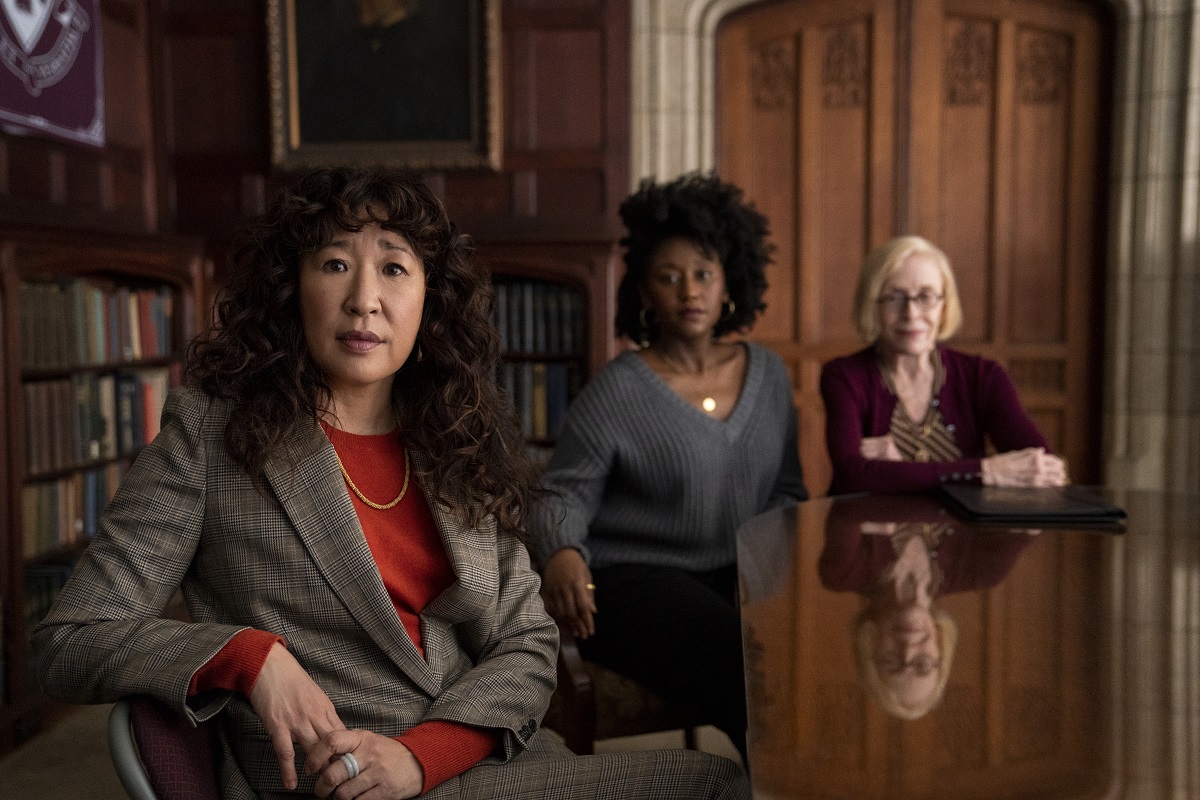The first season of Netflix’s new dramedy “The Chair” feels like prologue. Not only is the entire season shorter than “The Irishman” (six episodes at half an hour each) but it has a habit of introducing so many interesting ideas and characters only to then pull back from them, leaving you with the impression that this is all foreshadowing for a deeper story in season two. This isn’t that harsh a criticism—“The Chair” is breezy, funny, and often very smart. It’s just that it’s the rare Netflix show that left me wanting more instead of watching the clock.
The charming Sandra Oh plays Dr. Ji-Yoon Kim, the new English Department Chair at Pembroke College. Her promotion should be a major event at the highbrow center for learning given the history of white men running academia in this country, but she will be too busy putting out fires to really appreciate the moment. The department is already struggling to reach a student body that thinks it’s led by dinosaurs, especially the members of the faculty who have been there for decades, led by excellent performers Holland Taylor and Bob Balaban. They feel like they’re being pushed out by the next generation, led by a popular young professor named Yaz (Nana Mensah), and ignored by a dean (David Morse) obsessed with the bottom line.
A bomb is dropped into this conversation about ageism and representation when a popular but curmudgeonly professor named Bill Dobson (Jay Duplass) gives a Nazi salute during a lecture. The soundbite goes viral, sending the entire campus into a tailspin, but creators Annie Wyman and Amanda Peet (yes, that Amanda Peet) are very smart about how they wade into the choppy waters of cancel culture on college campuses. Yes, Bill’s gesture is taken out of context and probably shouldn’t destroy a career, but it sparks a larger conversation about who gets a seat at the table and how students should be listened to by those who purport to want to hear their voices, but often ignore them. There’s so much smart material here that the only disappointing aspect is how often “The Chair” feels like it’s just on the verge of really unpacking the changing dynamics between faculty and students in the ‘20s before pulling its punches ever so slightly.

Part of the problem is that Wyman and Peet try to do so much in six episodes of half-hour television. There’s also a complex potential romance between Ji-Yoon and Bill, an underdeveloped student character (Ella Rubin) who seems to want to help Bill, someone who gets caught up in Bill’s downfall, a precocious seven-year-old daughter (Everly Carganilla) for Ji-Yoon, and even a celebrity cameo in the final pair of episodes when the dean invites a very famous TV star to campus. It’s a show that endeavors to capture a woman who has to deal with a lot of spinning plates, but that structure can make it also feel shallow. We don’t spend enough time with any one plate before moving on, and it can make some of the insights feel thinner than they should. (I also struggled a bit with the representation of older teachers being entirely unable to relate to younger students. It’s a subplot about ageism that feels a little ageist itself, although Holland Taylor absolutely slays again.)
Ultimately, while some of the themes feel underdeveloped, “The Chair” remains one of the year’s breeziest and easiest shows. Oh does harried so well without losing her character’s intellect while Duplass is perfect in that gray space where we’re not really sure if we’re even supposed to like him. Is he the excellent educator being taken down by an overly sensitive system or the privileged slacker who has never had to consider the serious questions of his female or POC colleagues or students? (The answer is, of course, both, and that’s the duality that the writers and Duplass nail.)
So many Netflix shows feel stretched to meet a running time that they can’t possibly fill or are merely designed to be distractions to fit the algorithm. “The Chair” is more substantial than that, and it really feels like a warm-up for a show that could eventually take a seat at the table when it comes to the best on television.
Whole season screened for review.












